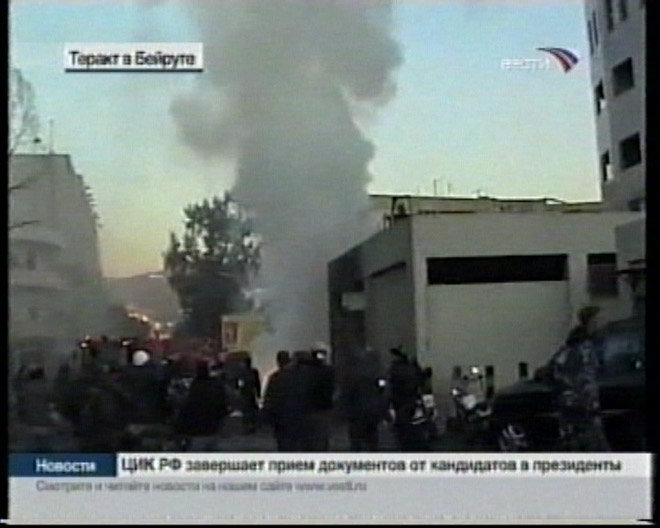Azerbaijan, Baku, 13 May / Trend corr R. Hafizoglu, A. Gasimova, E. Tariverdiyeva, D. Khatinoglu/ Lebanon's Army retains a neutral stance and does not interfere with present confrontation between the authorities and opposition. Foreign meddling in settlement of the conflict is unlikely and may be dangerous. "Lebanese Army has traditionally avoided involvement in internal conflicts because of concerns it could fragment," Gawdat Bahgat professor of political science University of Pennsylvania, said.
On 7May, the armed confrontation began in Lebanon. Hezbollah militants captured a significant part of Beirut. On 10May, Lebanese officials and militants concluded an armistice, but on 13thMay military operations were resumed in the north of the country.
"The Lebanese army, like the broader Lebanese society, reflects the sectarian mix. In the last few days, the army has tried to mediate between the government and Hezbollah. It is highly unlikely that the army would decisively take one side against the other," Bahgat said to Trend via e-mail on 13 May.
"Unfortunately, foreign powers are likely to continue their meddling in Lebanese affair. Any direct foreign intervention is likely to further escalate the conflict. In addition, the United States will have hard time opening another front ( U.S. is already involved in Afghanistan and Iraq). European powers are not likely to intervene without some arrangements with Washington," he said.
According to Bahgat, the Lebanese factions and government need to reach a national consensus on how political power would be distributed in the country with as little foreign intervention as possible.
"Each political corporation seeks dominance over the others, or, if that is not possible, a balance in which its interests and those of its constituents are not violated by the others," American political scientist Walter Reich of the George Washington University said.
"National" institutions are weak, undermined by partisan loyalties and the independent corporations. Consequently, there is no overarching, inclusive loyalty, no rule of law, and no peaceful procedures for resolving basic conflicts," Reich reported to Trend via e-mail on 13 May.
According to the political scientist, in Lebanon, these corporations are primarily defined by sect - Sunni, Shi'a, Christian, Druze. "The Druze and Christian militias did not act, and the Sunni militia limited itself to minor engagement. The Lebanese Army remained on the sidelines, respecting "neutrality," Reich said.
Lebanese Army's attempt to settle the situation in 1975-76 caused its split.
"Commander of Lebanese Army General Michel Suleyman does not want the same situation to happen again and therefore remains neutral between coalition and Hezbollah," Alireza Nourizadeh, Iranian export stated.
General Michel Suleyman, according to the expert, is a single candidate supported by all the Lebanese force, and it serves reason for the non interference of the Army into the conflict at this stage. On 13 May, Suleyman stated about the readiness of army to regulate the conflict only after all the sides agree for the army interference into the situation, Nourizadeh stated to Trend by a telephone from London.
This confrontation, according to the political scientist, was a strong strike on the image of Hezbollah movement, and it did not stick to its promise of not to use the armament purchased from Iran in internal conflicts. According to Hasan Nasrallah, he finds himself in a very delicate situation . "The practice of previous years clearly shows that the interference of foreign forces in Lebanon never stabilizes the situation," Nasrallah stated. In the case the Lebanese Shias ask assistance from Iran and Sunnits will also ask assistance from the Saudi Arabia and Egypt. From other side, Christians will demand support from France and United States that will lead to aggravation of the conflict".
"The situation in Lebanon is very volatile and dangerous as basic sectarian differences threaten the country's stability and peace. In addition, Syria has never accepted Lebanon's separation from Syria. Furthermore, Iran sees Hezbollah in Lebanon as an excellent proxy to further its ambitions towards Israel and the West," Professor Michael M. Gunter of the International University in Vienna reported to Trend via e-mail on 13 May.
"Finally, the United States see its interest in supporting the Christian-dominated government. No wonder instability and the renewal of civil war loom!" he said. According to Gunter, under these circumstances the Lebenese military are too weak to interfere decisively into the situation. If it tried, it might be split and destroyed. On the other hand, a more cautious approach by the Lebanese military might help calm the situation.
"Given the many problems concerning Iran, Myanmar, Iraq, Sudan, Abhazia, Kosovo, etc., it seems unlikely that an international peacekeeping force for Lebanon can be constituted at this time. Rather the various parties to the dispute named above must be convinced that a peaceful settlement is in their own interest," Gunter said.
"The scriptwriters of actions in Lebanon are Syria, Iran, Israel and United States," Akif Emre, Turkish political scientist believes. "The Lebanese government provokes the Hezbollah movement by checking the organization's potential, and attempts to weaken its political position in the eyes of the world community. The fact that the army does not interfere into the conflict, demonstrates the false tension of the situation," Emre, specialist on Middle East, reported from Istanbul by e-mail to Trend .
"I do not think that foreign forces will interfere into the conflict in Lebanon, as their interference could exaggerate the conflict which might cross the Lebanon borders, creating another area of tension in the Middle East," the expert considers.
In 2007, the contradiction between the state supporters and opposition turned into an armed conflict in Lebanon. 80 people died as a result of the conflict between the Hezbollah movement and Lebanon government, Lebanese media reported.






